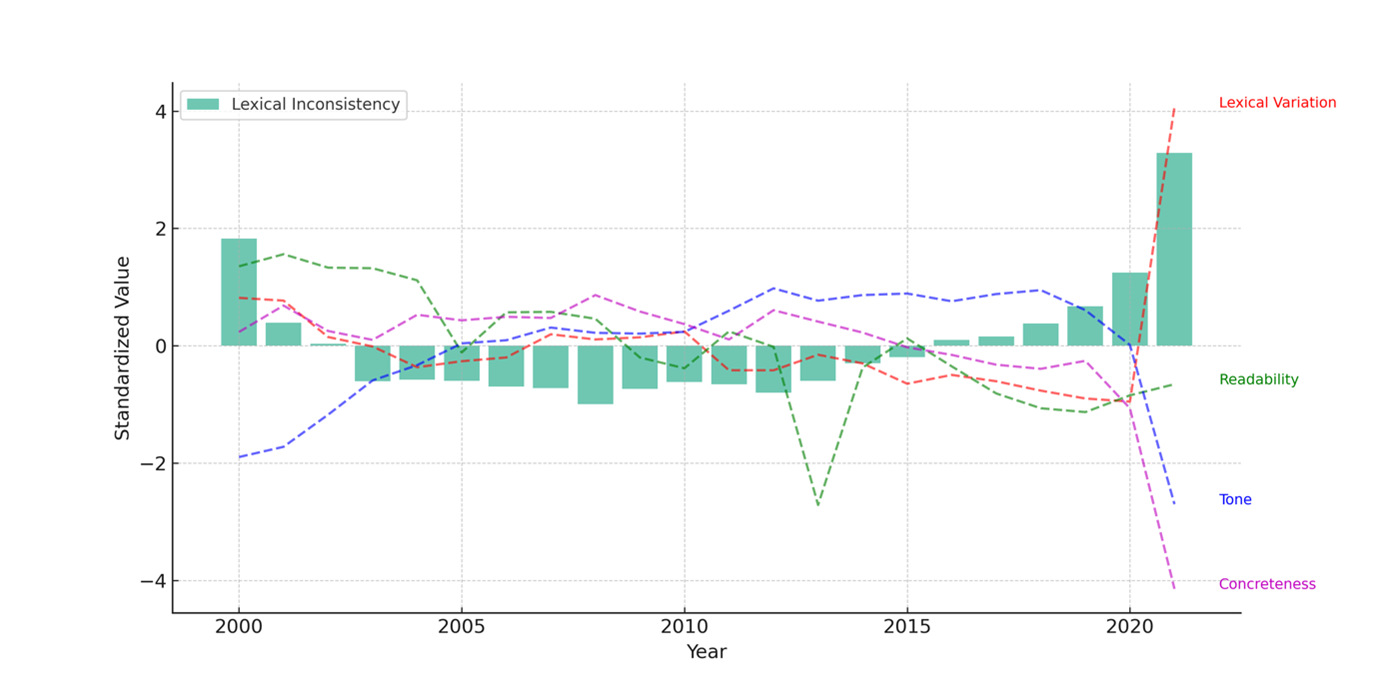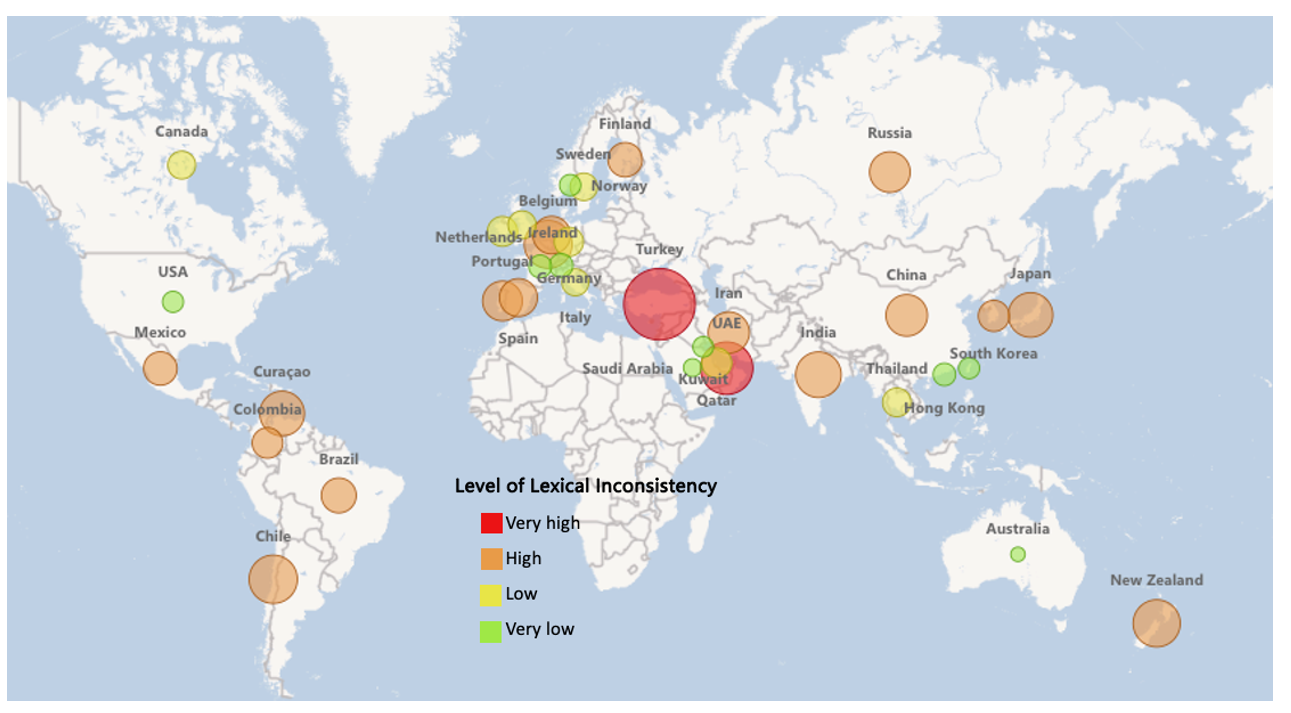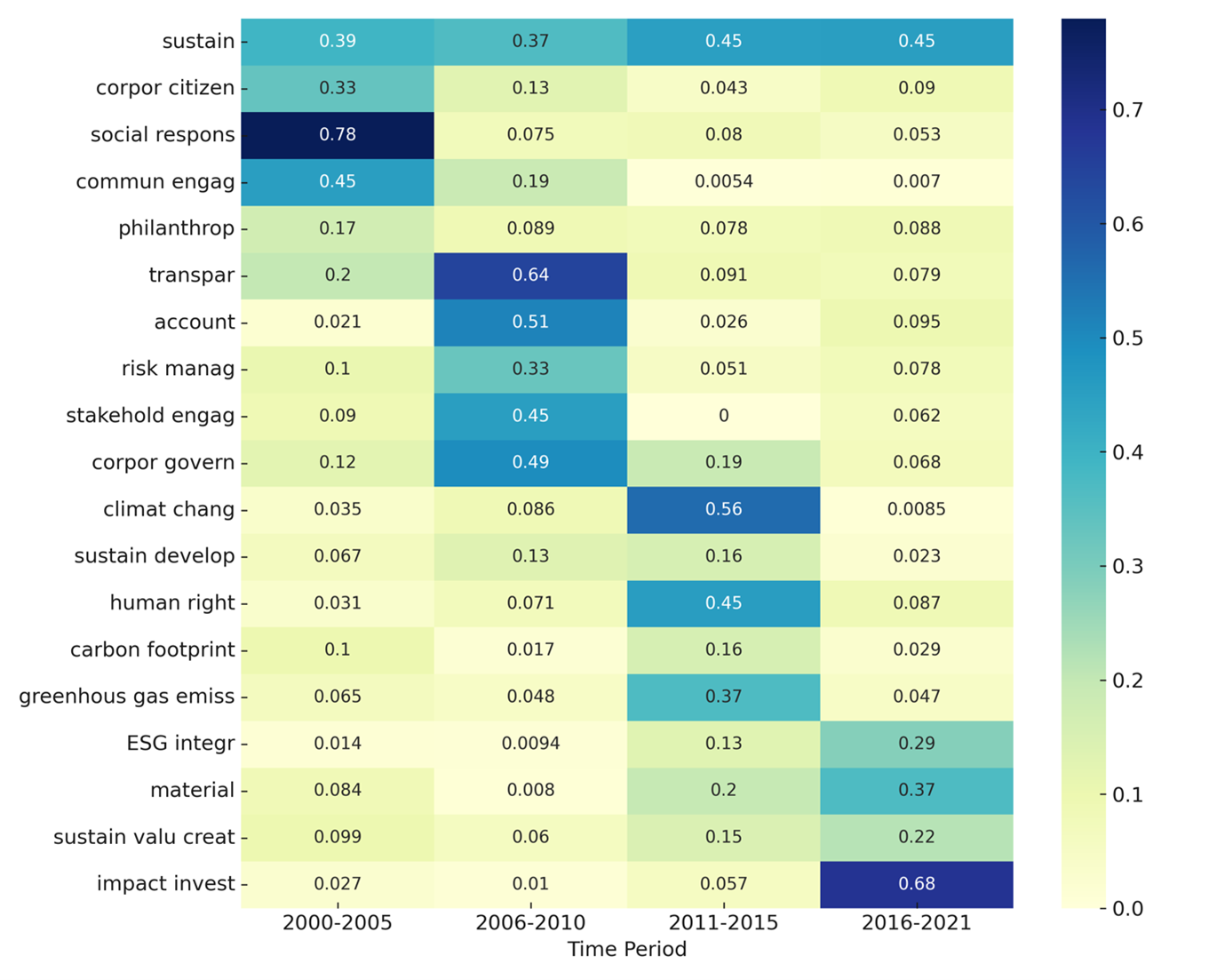Companies’ ability to communicate sustainability initiatives has become a litmus test for their authenticity and dedication to responsible practices. Lexical inconsistency may contribute to so-called ESG backlash. Adam William Chalmers and Robyn Klingler-Vidra assess the coherence of companies’ sustainability reports and find a growing language inconsistency over time, which can prompt suspicions of greenwashing (the act of embellishing sustainability efforts without substantive action).
Companies’ ability to communicate sustainability initiatives has become a litmus test for their authenticity and dedication to responsible practices. Yet, doing this well is not easy. Inconsistencies in language is one potential stumbling block, as it raises questions about alignment, credibility, and transparency. In fact, a lack of what is called “lexical consistency”, using the same words or terminology to refer to a specific concept throughout a text to avoid confusion and maintain clarity, has been identified as a key mechanism explaining so-called ESG-backlash. Among the top “CFO tips”, according to The Conference Board, is “for companies to avoid dramatic shifts in how they talk about ESG issues […]” as “nearly half (48 per cent) of companies that have faced [an ESG] backlash have altered their terminology, with many switching from ESG to ‘sustainability”.
This motivates us to ask: have companies gotten better, or worse, in being consistent in their ESG talk over time?
Examining lexical inconsistency
To offer new insight, we assess the coherence of companies’ sustainability reports. We employ two natural language processing (NLP) methods:
Cosine similarity using TF-IDF vectors, which calculates the resemblance between the language used in different reports, helping identify shifts in terminology over time.
Stylometric analysis, a tool that gauges lexical features such as vocabulary richness (lexical diversity measured as a type-token ratio), readability metrics like the Flesch-Kincaid ease of reading score, tone (sentiment analysis), and concreteness (the extent to which language uses tangible, perceptible, or concrete concepts as opposed to abstract notions).
By applying these techniques, we unveil patterns in the way companies express their ESG initiatives. We apply these methods to a database of more than 6500 corporate sustainability reports written by 320 of the world’s largest (based on market capitalisation) and “most admired” firms (based on two reputational indices, namely Dow Jones S&P Sustainability Index and Fortune’s Global Most Admired Companies). We included firms in seven major world regions: Africa, Asia, Europe, Middle East, North America, Oceania, and South America.
More or less consistency over time?
Figure 1 visualises the evolution of lexical (in)consistency within firms’ CSR communications over a 12-year period. From about 2002 to 2012, there’s a notable degree of stability, where language used in CSR reports remained relatively coherent.
A pivotal shift is witnessed in 2012, where the trend reverses, ushering in a pronounced surge in lexical inconsistency. This is accompanied by an uptick in reports that become progressively challenging to comprehend. In this period, the tone of communications also becomes overwhelmingly negative, potentially reflecting a response to emerging complexities in the CSR landscape. From 2019 to 2021, we see a massive spike in the lexical inconsistency in companies’ sustainability reports.
Figure 1. Lexical inconsistency over time

Note: all values have been standardised to facilitate analysis. Readability scale has been reversed so that higher = more difficult.
Is this growing inconsistency specific to different parts of the world? We analysed variation across countries to find out. Figure 2 visualises a clear disparity in linguistic coherence in CSR reporting on a global scale. Firms from the United States, Australia, France, Switzerland, Norway, Hong Kong, and Taiwan emerge as the most consistent, maintaining a relatively stable language in CSR reporting over time. In contrast, companies in South America predominantly fall into the “high” inconsistency category, exhibiting substantial fluctuations in their reporting lexicon. A notably erratic landscape is observed in countries like Turkey and the UAE, where firms demonstrate “very high” levels of lexical inconsistency. Asia presents a mixed picture: while firms in China and Japan exhibit high lexical inconsistency, those in Hong Kong and Taiwan demonstrate notable stability.
Figure 2. Change in lexical inconsistency over time and by country
 Finally, Figure 3 provides an overview of the changing language across four time periods between 2000 to 2021. While “sustainability” and its various cognate terms remain prominent across all time periods, we can see key shifts. For 2000-2005, the defining concept was “social responsibility”. Intriguingly, this term falls out of favour in later periods. For 2006-2010, the language of “transparency” and “accountability” were central. Notably, terms like “climate change” and “human rights” shift dramatically, revealing periods of increased focus (2011-2015) contrasted by relative neglect in other periods. Newer concepts, like “ESG integration,” “materiality,” and “impact investing” register as core concepts from 2016-2021, hinting at a potential paradigm shift towards financial reporting and activity.
Finally, Figure 3 provides an overview of the changing language across four time periods between 2000 to 2021. While “sustainability” and its various cognate terms remain prominent across all time periods, we can see key shifts. For 2000-2005, the defining concept was “social responsibility”. Intriguingly, this term falls out of favour in later periods. For 2006-2010, the language of “transparency” and “accountability” were central. Notably, terms like “climate change” and “human rights” shift dramatically, revealing periods of increased focus (2011-2015) contrasted by relative neglect in other periods. Newer concepts, like “ESG integration,” “materiality,” and “impact investing” register as core concepts from 2016-2021, hinting at a potential paradigm shift towards financial reporting and activity.
Figure 3. The changing language of ESG and sustainability reporting

Policy implications
We find a growing inconsistency over time, particularly in some parts of the world, and towards investor-focused language in the latest period. Inconsistency in the language used in sustainability reports can have important implications for companies and their stakeholders. This phenomenon casts a shadow on a company’s perceived commitment to sustainability. Abrupt changes in how sustainability issues are articulated can prompt suspicions of greenwashing, the act of embellishing sustainability efforts without substantive action.
What can companies learn from this? CSR issues are not static; companies need to respond to evolving stakeholder expectations, regulatory changes, and societal challenges. Therefore, a degree of lexical evolution is natural and even expected. But companies need to balance this with an emphasis on the issues and language that are central to them, given their business. Rather than trying to engage global issues and language, our advice is for CSR communications teams to focus on their company’s core issues, and to be consistent in the way they talk.
- This blog post represents the views of its author(s), not the position of LSE Business Review or the London School of Economics.
- Featured image provided by Shutterstock.
- When you leave a comment, you’re agreeing to our Comment Policy.





